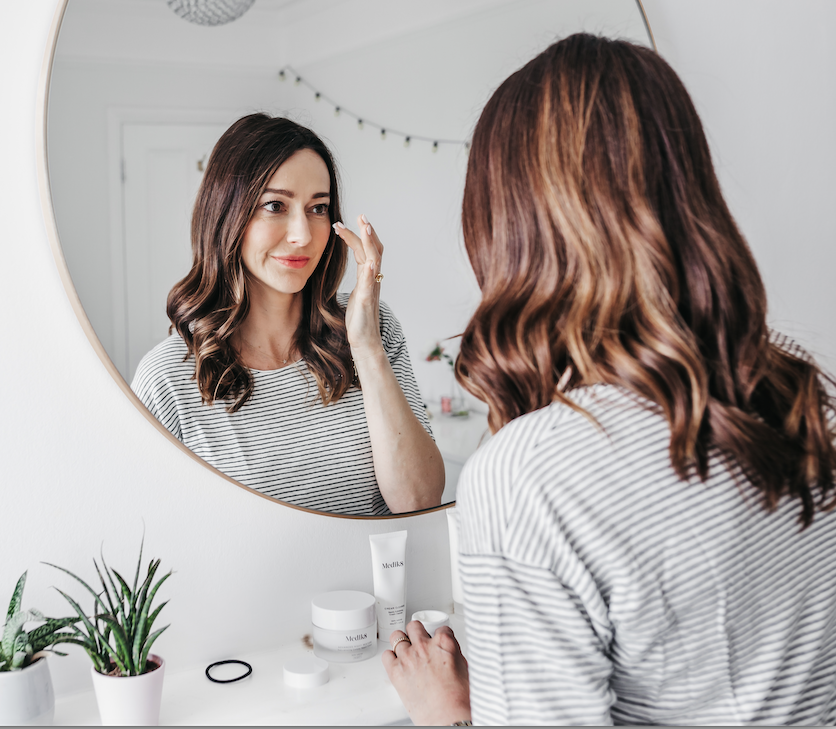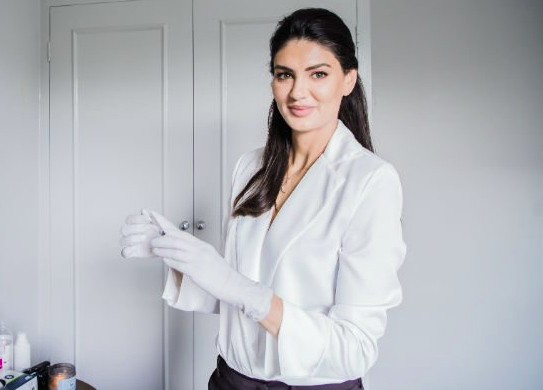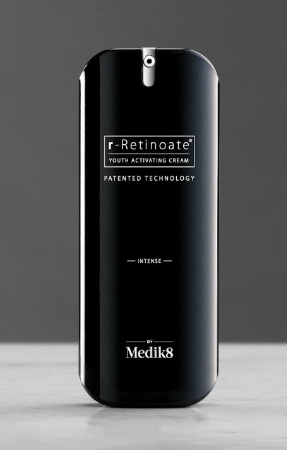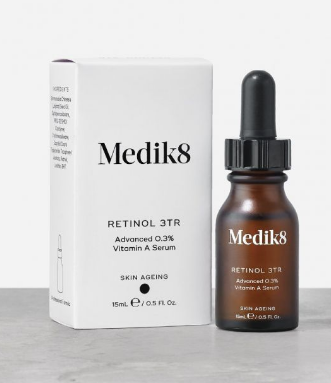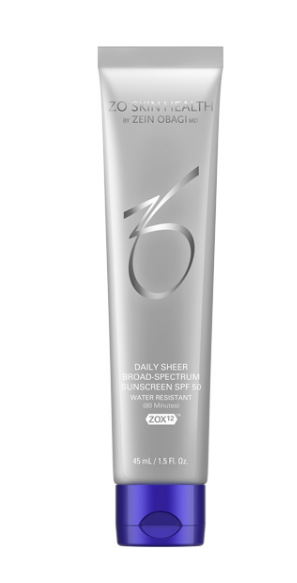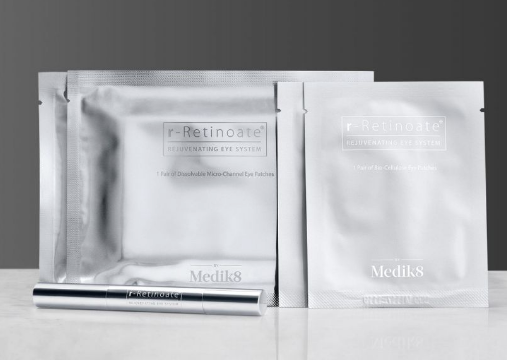One of the most revered products in the beauty industry used properly and with the right know how this product really is game changer.
So here’s everything you need to know about retinol from how it works to why and how you should be using it.
So for starters, what is Retinol?
Retinol belongs to a class of compounds known as retinoids. These agents are derived from vitamin A, an ingredient that increases cell turnover and enhances collagen production. Not only does it impressively decrease wrinkles but it’s lauded for its ability to clear up acne and blur pigmentation caused by sun damage.
How does it work?
As a person ages, collagen and cell production slow down, but retinol helps to encourage cell regeneration and ensure that new collagen continues to form. As collagen is replenished and old skin cells are shed, fine lines recede and skin appears brighter and smoother.
Retinol accelerates natural desquamation, smooths away wrinkles and skin irregularities by stimulating cellular regeneration.
It also has a deeper action on the dermis by stimulating the synthesis of collagen and GAGs and inhibits MMPs (matrix metalloproteinases), responsible for the degradation of dermal fibers (collagen and elastin).
Dr Pamela Benito, facial aesthetics expert also explains, “Retinol reactivates the skin renewal process and can be a great primer to prepare skin for chemical peels and other medical procedures.”
When should you apply it?
Retinol breaks down in sunlight and exposure to UV light renders it less active.
Also cell turn over and regeneration happens whilst you sleep so it’s recommended to apply retinol as part of your evening skin care routine.
Dr Pamela Benito advices, “Retinol can be destabilised by UV and it may make skin more sensitive to the sun so it is highly recommended to wear daily SPF50. Also when paired with other antioxidants it helps to defend the skin from free radicals and environmental damage.”
How should you apply it?
To avoid your face falling retinol should be built up gradually. This is what dermatologists refer to as the retinol ladder. If you apply too much too soon you can end up with redness and dry patches.
So for starters aim to apply it once a week, building it up to two or three times and see how your skin reacts. The aim is to gradually introduce the ingredient and allow your skin to build a tolerance.
Make sure you are not using an other products that contain retinol. This is where I went wrong. I was unaware that my cleanser contained a low level of Retinol so the combination ended up being lethal.
A useful tip is to mix it with your moisturiser to dilute it a bit.
Another important thing you need to know about is that if you're using Retinol you HAVE to wear a high factors SPF during the day to protect your skin from UV.
Experts also recommend you use it 3 months, then to take a three month break. This is due to research that suggests cell turnover is no longer increased after 3 months of retinol usage.
What should I use?
OK so it’s important to know that not all retinol products work the same and deliver the same results. And sadly it’s not as simple as looking at the precentage. This is where the confusion creeps in. Formulation is everything. Retinol is sensitive to air and light, so it’s all about how its encapsulated. An increasing amount of beauty brands are formulating products with encapsulated retinol, which is delivered to the skin alongside a slew of other skin-perfecting ingredients, such as hyaluronic acid and ceramides. They act like a buffer preventing some of the negative side effects.
As a result people with sensitive skin who previously struggled with Retinol can now use products containing a time released Retinol making them gentler on the skin and less likely to cause irritation. The results being flawless NOT flaky skin.
Medik8 have just released the Rolls Royce of retinol creams R-Retinoate Intense. It’s the first time their most powerful forms of vitamin A have been both stabilised and combined into one product. This new formulation utilises exclusive retinol retinoate and revolutionary retinaldehyde.
Medik8 Brothers Elliot and Daniel Isaacs call it their finest achievement to date. “It is quite simply the best anti-ageing product we have ever made, and by far the most exciting vitamin A product on the market.”
The all-in-one cream features a total of 3 patented and patent-pending technologies but at £210 it doesn’t come cheap. But when it comes to Retinol it does seem to be a case of getting what you pay for.
That’s not to say you need to spend hundreds of pounds to get a good result. There are more affordable serums on the market that deliver great results. Medik8 offer retinol products (Retinol 3TR) for as little as £29.
Dr Pamela Benito explains ‘The difference between retinol and retinoids is that over the counter products contain a form of retinol in ester forms (like retinyl palmitate, retinyl acetate) that need to be converted into retinoid acid by the skin at the cellular level in order for the skin to use it. Basically, the more conversions it takes for an ester form to get to the retinoic acid form the weaker it is. In the contrary, prescription-based retinoids (under the names Retin-A and Tretinoin) contain higher concentrations of retinoic acid compared to OTC options. Biochemically, retinoids and retinol do exactly the same thing; it may just take longer to see results with retinol-based products because they are weaker.”
How does it work?
As a person ages, collagen and cell production slow down, but retinol helps to encourage cell regeneration and ensure that new collagen continues to form. As collagen is replenished and old skin cells are shed, fine lines recede and skin appears brighter and smoother.
Retinol accelerates natural desquamation, smooths away wrinkles and skin irregularities by stimulating cellular regeneration.
It also has a deeper action on the dermis by stimulating the synthesis of collagen and GAGs and inhibits MMPs (matrix metalloproteinases), responsible for the degradation of dermal fibers (collagen and elastin).
Dr Pamela Benito, facial aesthetics expert also explains, “Retinol reactivates the skin renewal process and can be a great primer to prepare skin for chemical peels and other medical procedures.”
When should you apply it?
Retinol breaks down in sunlight and exposure to UV light renders it less active.
Also cell turn over and regeneration happens whilst you sleep so it’s recommended to apply retinol as part of your evening skin care routine.
Dr Pamela Benito advices, “Retinol can be destabilised by UV and it may make skin more sensitive to the sun so it is highly recommended to wear daily SPF50. Also when paired with other antioxidants it helps to defend the skin from free radicals and environmental damage.”
How should you apply it?
To avoid your face falling off retinol should be built up gradually. This is what dermatologists refer to as the retinol ladder. If you apply too much too soon you can end up with redness and dry patches.
So for starters aim to apply it once a week, building it up to two or three times and see how your skin reacts. The aim is to gradually introduce the ingredient and allow your skin to build a tolerance.
Make sure you are not using any other products that contain retinol. This is where I went wrong. I was unaware that my cleanser contained a low level of Retinol so the combination ended up being lethal.
A useful tip is to mix it in with your moisturiser to dilute it a bit.
Another important thing you need to know about is that if you're using Retinol you HAVE to wear a high factors SPF during the day to protect your skin from UV.
Experts also recommend you use it 3 months, then to take a three month break. This is due to research that suggests cell turnover is no longer increased after 3 months of retinol usage.
What should I use?
OK so it’s important to know that not all retinol products work the same and deliver the same results. And sadly it’s not as simple as looking the percentage. This is where the confusion creeps in. Formulation is everything. Retinol is sensitive to air and light, so it’s all about how its encapsulated. An increasing amount of beauty brands are formulating products with encapsulated retinol, which is delivered to the skin alongside a slew of other skin-perfecting ingredients, such as hyaluronic acid and ceramides. They act like a buffer preventing some of the negative side effects.
As a result people with sensitive skin who previously struggled with Retinol can now use products containing a time released Retinol making them gentler on the skin and less likely to cause irritation. The results being flawless NOT flaky skin. Medik8 have recently launched their two new strengths of Crystal Retinal – 1 (0.01%) and 3 (0.03%) which are gentle strength retinaldehyde’s allowing those with the most sensitive of skins to introduce a retinol to their regime.
And earlier this year Medik8 released the Rolls Royce of retinol creams R-Retinoate Intense. It’s the first time their most powerful forms of vitamin A have been both stabilised and combined into one product. This new formulation utilises exclusive retinol retinoate and revolutionary retinaldehyde. The cream costs £210 but has proven to be incredibly popular based purely on its success.
Medik8 Brothers Elliot and Daniel Isaacs call it their finest achievement to date. “It is quite simply the best anti-ageing product we have ever made, and by far the most exciting vitamin A product on the market.”
The all-in-one cream features a total of 3 patented and patent-pending technologies but at £210 it doesn’t come cheap. But when it comes to Retinol it does seem to be a case of getting what you pay for.
That’s not to say you need to spend hundreds of pounds to get a good result. There are more affordable serums on the market that deliver great results. Medik8 offer retinol products (Retinol 3TR) for as little as £29.
Dr Pamela Benito explains ‘The difference between retinol and retinoids is that over the counter products contain a form of retinol in ester forms (like retinyl palmitate, retinyl acetate) that need to be converted into retinoid acid by the skin at the cellular level in order for the skin to use it. Basically, the more conversions it takes for an ester form to get to the retinoic acid form the weaker it is. In the contrary, prescription-based retinoids (under the names Retin-A and Tretinoin) contain higher concentrations of retinoic acid compared to OTC options. Biochemically, retinoids and retinol do exactly the same thing; it may just take longer to see results with retinol-based products because they are weaker.”
I recommend:
Institut Esthederm Intensive Retinol Cream, £59 Lookfantastic.com
Institut Estherderm have stabilised the most active form in its serum: pure retinol. It is immediately released and acts fast, resulting in an intensive anti-ageing effect.
In its cream formula, the brand has stabilised a precursor of retinol, for gradual, continuous release and long-term effectiveness.
The serum and the cream are recommended to be used as a cure of 2-3months : the serum every evening and the cream to be used day and/or night.
Contains 0.3% retinol supported by Vitamin E this light and fast absorbing serum is suitable for those in their late 20s and 30s and perfect for anyone looking to introduce retinol into their routine. After cleansing in the evening massage 4 drops across the face, neck and décolletage. Use twice a week for the first 2 weeks, every other night for the next 2 weeks then every night.
ZO Skin Health Daily Sheer SPF 50 (RRP £57)
This non-greasy, quick drying sunscreen blends seamlessly into the skin for a sheer matte finish. Water and perspiration resistant this sunscreen provides daily-broad spectrum protection against harmful, skin ageing UVA rays and skin burning UVB rays, plus packed with added hydration, this sunscreen helps maintain the skin’s natural moisture balance, helping to prevent dryness from increased outdoor exposure.
R-Retinoate Day & Night Eye Serum
Medik8 are launching their latest addition to their youth activating range. This lightweight, nourishing eye serum delivers their revolutionary molecule, retinyl retinoate, to the eye area.
This serum sinks effortlessly into the eye contours and can be used in the day as well as the night for accelerated results. Additional eye care ingredients including caffeine for dark circles and hesperidin for puffiness have been included to promote a more even, bright and radiant eye area.
In the meantime I recommend their Rejuvenating Eye System, £110, an intense 4-week eye treatment containing r-Retinoate Youth Activating Cream.






